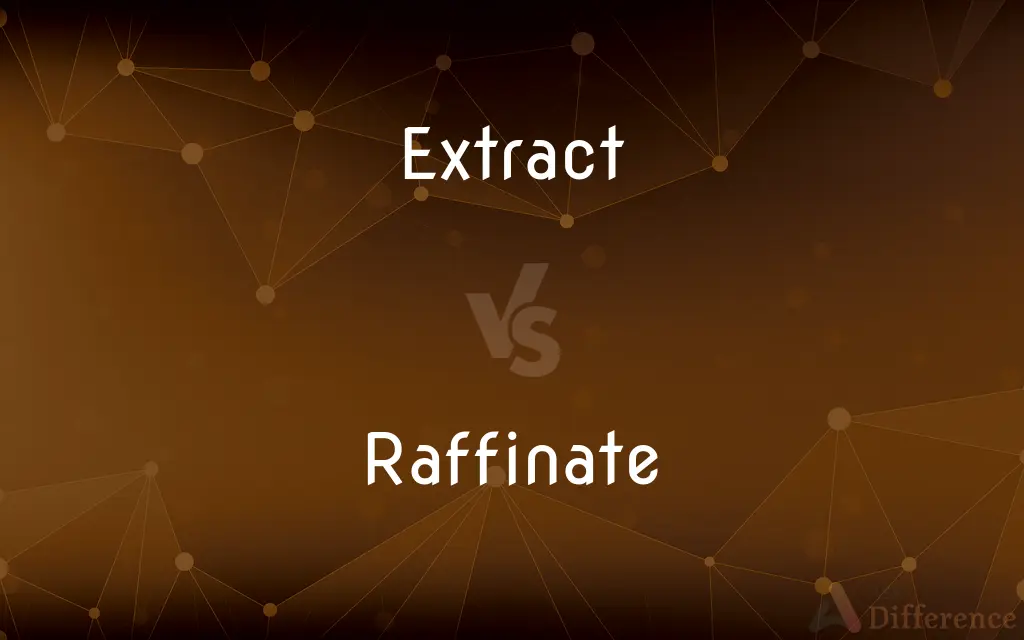Extract vs. Raffinate — What's the Difference?
By Fiza Rafique & Maham Liaqat — Updated on March 15, 2024
Extract refers to the component removed from a mixture during a separation process, rich in the desired substance, while raffinate is the leftover mixture, depleted in the targeted component.

Difference Between Extract and Raffinate
Table of Contents
ADVERTISEMENT
Key Differences
In a separation process, such as liquid-liquid extraction, the extract is the phase that absorbs the substance of interest from the original mixture. This phase becomes enriched with the target component, making the extract valuable for further processing or use. On the other hand, the raffinate is the residual phase that remains after the desired substance has been removed. It contains the lesser amount of the targeted component, often along with other constituents of the original mixture.
The composition of the extract will vary depending on the efficiency of the extraction process and the solubility of the desired component in the selected solvent. The more effective the solvent at dissolving the targeted substance, the richer the extract will be. Conversely, the raffinate's composition is influenced by how much of the target substance remains after the extraction, often containing the bulk of the non-desired components.
In industrial applications, the value of the extract and raffinate can vary significantly. The extract, being rich in the desired substance, is typically the focus of the extraction process and may undergo further purification or processing. The raffinate, while considered a by-product, may still hold value and can be subjected to additional treatments to recover any remaining valuable components or be disposed of in an environmentally safe manner.
The efficiency of the extraction process is critical in determining the quality of both the extract and raffinate. High-efficiency extractions result in an extract with high purity and a raffinate with minimal amounts of the targeted component. This efficiency is influenced by factors such as the choice of solvent, the temperature, and the mixing intensity during the extraction process.
Both extract and raffinate play important roles in the context of separation science and industrial processes. Understanding the properties and potential uses of each can lead to optimized processes, better resource utilization, and reduced waste.
ADVERTISEMENT
Comparison Chart
Definition
The phase that absorbs the targeted component.
The residual phase after the target component is removed.
Composition
Enriched with the desired substance.
Depleted in the targeted component, contains other materials.
Value
Typically high, as it contains the substance of interest.
Often lower, but can still hold value for further processing.
Influence Factors
Solvent efficiency, solubility of the target component.
Efficiency of extraction, remaining constituents.
Industrial Role
Often undergoes further processing or purification.
May be treated to recover remaining value or disposed of safely.
Compare with Definitions
Extract
The portion of a mixture that contains the targeted substance after extraction.
The oil extract from lavender is used in aromatherapy.
Raffinate
The leftover mixture after the desired substance is removed.
The raffinate from sugar beet processing is used as animal feed.
Extract
A concentrated form of a desired component separated from a mixture.
Vanilla extract is a key flavoring in baking.
Raffinate
The depleted phase in an extraction process, containing lesser amounts of the target component.
The raffinate from copper extraction still contains trace metals.
Extract
The result of separating a compound from its mixture using a solvent.
The rosemary extract is prized for its culinary and medicinal properties.
Raffinate
The phase in liquid-liquid extraction that is depleted in the solute.
The raffinate phase is further treated to recover any remaining solute.
Extract
The product of an extraction process, enriched with a specific substance.
The caffeine extract from coffee beans is used in soft drinks.
Raffinate
The by-product of an extraction process, potentially holding residual value.
Raffinate from essential oil production may retain aromatic compounds.
Extract
The phase in liquid-liquid extraction that absorbs the solute.
The extract phase in the separation process contains the high-purity product.
Raffinate
The residual solution after the extraction of a desired solute.
The raffinate from uranium enrichment contains lower concentrations of the isotope.
Extract
An extract is a substance made by extracting a part of a raw material, often by using a solvent such as ethanol, oil or water. Extracts may be sold as tinctures, absolutes or in powder form.
Raffinate
In chemical separation terminology, the raffinate (from French raffiner, to refine) is a product which has had a component or components removed. The product having the removed materials is referred to as the extract.
Extract
Remove or take out, especially by effort or force
The fossils are extracted from the chalk
Raffinate
A liquid from which impurities have been removed by solvent extraction.
Extract
Calculate (a root of a number)
Early computers had an instruction to extract a square root
Raffinate
The portion of an original liquid that remains after other components have been dissolved by a solvent.
Extract
A short passage taken from a text, film, or piece of music
An extract from a historical film
Raffinate
(chemistry) A solution from which some material has been removed by extraction with an immiscible liquid
Extract
A preparation containing the active ingredient of a substance in concentrated form
Natural plant extracts
A shampoo with extract of camomile
Raffinate
To separate by means of raffination
Extract
To draw or pull out, often with great force or effort
Extract a wisdom tooth.
Used tweezers to extract the splinter.
Extract
To obtain despite resistance
Extract a promise.
Extract
To obtain from a substance by chemical or mechanical action, as by pressure, distillation, or evaporation.
Extract
To remove for separate consideration or publication; excerpt.
Extract
To derive or obtain (information, for example) from a source.
Extract
To deduce (a principle or doctrine); construe (a meaning).
Extract
To derive (pleasure or comfort) from an experience.
Extract
(Mathematics) To determine or calculate (the root of a number).
Extract
A passage from a literary work; an excerpt.
Extract
A concentrated preparation of the essential constituents of a food, flavoring, or other substance; a concentrate
Maple extract.
Extract
Something that is extracted or drawn out.
Extract
A portion of a book or document, incorporated distinctly in another work; a citation; a quotation.
I used an extract of Hemingway's book to demonstrate culture shock.
Extract
A decoction, solution, or infusion made by drawing out from any substance that which gives it its essential and characteristic virtue
Extract of beef
Extract of dandelion
Vanilla extract
Extract
Any substance extracted is such a way, and characteristic of that from which it is obtained
Quinine is the most important extract of Peruvian bark.
Extract
A solid preparation obtained by evaporating a solution of a drug, etc., or the fresh juice of a plant (distinguished from an abstract).
Extract
(obsolete) A peculiar principle (fundamental essence) once erroneously supposed to form the basis of all vegetable extracts.
Extract
Ancestry; descent.
Extract
A draft or copy of writing; a certified copy of the proceedings in an action and the judgment therein, with an order for execution.
Extract
(transitive) To draw out; to pull out; to remove forcibly from a fixed position, as by traction or suction, etc.
To extract a tooth from its socket, a stump from the earth, or a splinter from the finger
Extract
(transitive) To withdraw by expression, distillation, or other mechanical or chemical process. Compare abstract (transitive verb).
To extract an essential oil from a plant
Extract
(transitive) To take by selection; to choose out; to cite or quote, as a passage from a book.
Extract
(transitive) To select parts of a whole
We need to try to extract the positives from the defeat.
Extract
To determine (a root of a number).
Please extract the cube root of 27.
Extract
To draw out or forth; to pull out; to remove forcibly from a fixed position, as by traction or suction, etc.; as, to extract a tooth from its socket, a stump from the earth, a splinter from the finger.
The beeSits on the bloom extracting liquid sweet.
Extract
To take by selection; to choose out; to cite or quote, as a passage from a book.
I have extracted out of that pamphlet a few notorious falsehoods.
Extract
That which is extracted or drawn out.
Extract
A portion of a book or document, separately transcribed; a citation; a quotation.
Extract
A decoction, solution, or infusion made by dissolving out from any substance that which gives it its essential and characteristic virtue; essence; as, extract of beef; extract of dandelion; also, any substance so extracted, and characteristic of that from which it is obtained; as, quinine is the most important extract of Peruvian bark.
Extract
A peculiar principle once erroneously supposed to form the basis of all vegetable extracts; - called also the extractive principle.
Extract
Extraction; descent.
Extract
A draught or copy of writing; certified copy of the proceedings in an action and the judgement therein, with an order for execution.
Extract
A solution obtained by steeping or soaking a substance (usually in water)
Extract
A passage selected from a larger work;
He presented excerpts from William James' philosophical writings
Extract
Draw or pull out, usually with some force or effort; also used in an abstract sense;
Pull weeds
Extract a bad tooth
Take out a splinter
Extract information from the telegram
Extract
Get despite difficulties or obstacles;
I extracted a promise from the Dean for two ne positions
Extract
Deduce (a principle) or construe (a meaning);
We drew out some interesting linguistic data from the native informant
Extract
Extract by the process of distillation;
Distill the essence of this compound
Extract
Separate (a metal) from an ore
Extract
Obtain from a substance, as by mechanical action;
Italians express coffee rather than filter it
Extract
Take out of a literary work in order to cite or copy
Extract
Calculate the root of a number
Common Curiosities
How can the efficiency of an extraction process be improved?
Efficiency can be improved by optimizing solvent selection, adjusting process conditions, and employing techniques to enhance the contact between phases.
Why is the extract more valuable than the raffinate?
The extract is typically more valuable because it is enriched with the targeted component of interest, which is the primary goal of the extraction process.
Is it possible to recover the solvent from the extract and raffinate?
Yes, solvent recovery is an important aspect of many extraction processes, both to reduce costs and to minimize environmental impact.
Can the raffinate have any practical use?
Yes, the raffinate may still contain valuable components or substances that can be recovered through further processing or used in other applications.
What factors affect the quality of the extract and raffinate?
Factors include the efficiency of the extraction process, the choice of solvent, the solubility of the target component in the solvent, and process conditions like temperature and mixing.
Are extract and raffinate always in liquid form?
While often in liquid form, especially in liquid-liquid extractions, the extract and raffinate can also be gaseous or solid, depending on the substances involved and the extraction method.
What happens to the raffinate after extraction?
The treatment of raffinate depends on its composition and potential value; it can be further processed to recover valuable substances, repurposed for other uses, or properly disposed of.
Can an extraction process have multiple extracts and raffinates?
Yes, complex extractions or those involving multiple stages can produce several extracts and raffinates, each with different compositions and values.
How is the choice of solvent crucial in an extraction process?
The solvent's ability to selectively dissolve the targeted component and its ease of separation from the extract phase are crucial for the process's efficiency and the extract's purity.
Can the composition of the extract and raffinate change over time?
The immediate composition is usually stable, but long-term changes can occur due to reactions within the phases or solvent evaporation, especially if not stored properly.
How do temperature and pressure affect extraction processes?
Temperature and pressure can significantly influence the solubility of the targeted component in the solvent and the efficiency of the extraction, with optimal conditions varying by system.
What is the environmental impact of disposing of raffinates?
The environmental impact depends on the raffinate's composition; proper treatment and disposal methods are crucial to minimize any negative effects.
How are extract and raffinate separated from each other in a process?
Separation techniques depend on the system, including decanting, centrifugation, or using a separatory funnel, based on the phases' densities and properties.
Share Your Discovery

Previous Comparison
Red vs. Burgundy
Next Comparison
Stenotopic vs. EurytopicAuthor Spotlight
Written by
Fiza RafiqueFiza Rafique is a skilled content writer at AskDifference.com, where she meticulously refines and enhances written pieces. Drawing from her vast editorial expertise, Fiza ensures clarity, accuracy, and precision in every article. Passionate about language, she continually seeks to elevate the quality of content for readers worldwide.
Co-written by
Maham Liaqat














































